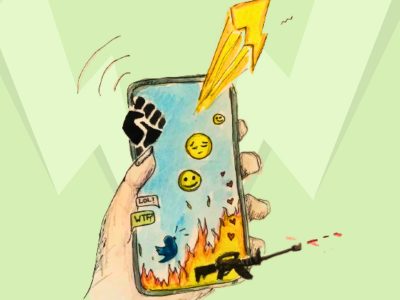U.S. Surgeon General Vivek Murthy recently issued a public advisory warning about the risks of social media on young people.
In the midst of Montana banning TikTok, Utah restricting social media services for users under 18 and Facebook whistleblowers confessing the company’s knowledge of the harm their platform causes its users, it seems social media networks have grown taboo in politics. This increased hesitancy to embrace social media should spread to college campuses, especially amongst incoming freshmen.

Considering the first way you make friends and meet potential roommates is following everybody with BU Class of 2027 in their bios, joining Facebook groups and posting to Snapchat stories, the prospect of unplugging for freshman year may feel like the naive words of someone too far removed from the experience of being new.
However, despite using social media for initial connections, virtual friends rarely make it for the long haul. Inventive replies to Instagram stories may be a great way to get yourself out of the dorm those first few days on campus, but relying on direct messages via social media robs you of the chance to meet people organically.
For some, it can be easy to meet five people and call it a year, content with the crew they accrued during their Boston University genesis. But the key to college is fluidity and adaptation.
Making friends shouldn’t be a state of mind you assume for a week and turn off after finding the WatchMojo Top 10 Coolest People on the Timeline. Getting too comfortable with social media might foster an antisocial energy in the real world. If you’re content with the followers and group chats, why bother talking to the person sitting next to you in lab or joining a club that has nothing to do with your major?
Additionally, these warnings come with the mindset that social networks are being used to make friends, ignoring their modus operandi: to incite jealousy.
Just as easily, the loneliness of a freshman semester can be exacerbated by constant exposure to what everyone else is doing all the time. Whether that be seeing other freshmen who’ve seemingly already made their BFFs for the next four years or constantly refreshing your feed to make sure you’re out-partying your high school friends — the anxiety of comparison makes it that much harder to live in the present.
Another aspect of social media which may stop you from actually living is escapism. We all know the bliss of retreating into TikTok for seven hours of dopamine-laced content that makes our brains go “yay.” Still, avoiding the scary experience of meeting new people by ignoring reality delays problems without resolution.
Referring to social media usage as a choice versus a necessity is, of course, a privileged take. For many LGBTQ+ students for example, social media presents an opportunity to find others in their community when they’re unable to do so beyond the screen. When you can’t express yourself as you’d like on a daily basis, having people there, even virtually, who understand your experience can make a world of difference.
For those who suffer from physical or mental health issues that make in-person socialization a taxing, or even impossible, experience, social media offers a possibility for connection in a more accessible arena.
This feature of social media, being a melting pot of voices, a blanket from the loneliness of the real world, is acknowledged by the surgeon general’s report. With that however, the many harms of excessive social media usage such as attention problems, sleep issues, feelings of exclusion, depression and anxiety are cited as well, and cannot be discounted.
Assuming you are reading this and are among the target audience for this advice, you are young. Maybe you’ve been using a phone since you were six. You were probably in middle school when “13 Reasons Why” came out and we all got letters home about the dangers of cyberbullying. You were probably also forced to watch the 2011 movie “Cyber Bully.”
We’ve been hearing of the dangers of social media since we were kids. Now as young adults, hearing forty-somethings rant about TikTok and why Instagram is bad for you feels a lot like getting stabbed in super slow motion, like it takes 10 years for the knife to make contact as some guy nonchalantly watches from the sidelines. And then when you finally start bleeding he asks: “Are you okay?” No. You’ve just been stabbed and he did nothing about it for ten years.
It’s easy to think that because of this removed attitude towards social media addiction we all have, that it’s a moot point to delete Instagram. We’re all aware we use the apps too much, and we’re content with just being aware. But just knowing something is hurting you doesn’t make the hurt stop. So if you feel social media is a pain, perhaps seek a band aid.
Deleting the apps which worry you is an easy solution. And if you need a quick fix Instagram, Facebook and Twitter are a millisecond away for you to check in on friends on your laptop, avoiding constantly opening the app on your phone.
All in all, social media, like anything else, is about knowing your limits and exhibiting control. No one is calling for a ban or asking you to throw your phone in the ocean (besides from Lorde in her 2021 single Solar Power), but friends can be found in many places that are not lines of code.
Join clubs, talk to people in classes, ask to sit with strangers at the dining hall if you feel so moved — it can be exhausting and draining and sometimes it won’t work. Your freshman year may be great, or it may be a flop, but at least you know you left your fate up to your words and not your Twitter fingers.






















































































































